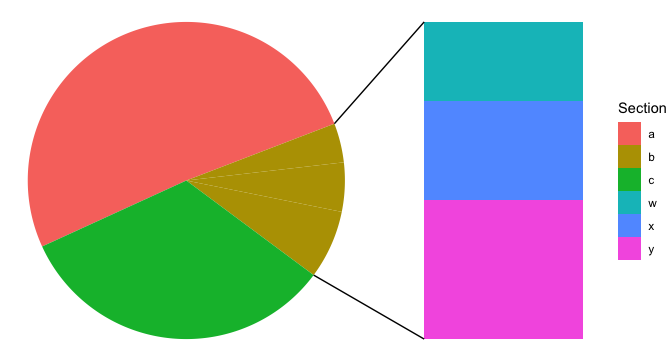Here's an approach relying more on drawing the elements in a single plot space. This implementation isn't particularly general but might be okay if the output is a one-off.
First, some fake data:
my_data <- data.frame(
stringsAsFactors = F,
Section = c("a", "b", "b", "b", "c"),
Detail = letters[22:26],
Amount = c(0.51, 0.04, 0.05, 0.07, 0.33)
)
Now, loading some libraries and noting the coordinates of the wedge edges.
library(ggplot2); library(ggforce); library(dplyr)
my_data_aug <- my_data %>%
mutate(arc_start = cumsum(lag(Amount, default = 0)) * 2*pi - 2,
arc_end = cumsum(Amount) * 2*pi - 2,
x_pos = 0 + cos(arc_start - pi/2),
y_pos = 1 - sin(arc_start - pi/2))
The detail for the bar chart section:
my_data_detail <- my_data_aug %>%
filter(Section == "b") %>%
purrr::map_df(rev) %>% # This reverses the order
mutate(Amount_scaled = Amount / sum(Amount) * 2)
The detail for the segment lines:
my_data_lines <- my_data_aug %>%
filter(Section == "b" | lag(Section == "b")) %>%
slice(1, n())
Now, all together:
ggplot(my_data_aug) +
geom_arc_bar(aes(x0 = 0, y0 = 1,
r0 = 0, r = 1,
fill = Section,
start = arc_start,
end = arc_end), color = NA) +
geom_tile(data = my_data_detail,
aes(x = 2,
y = cumsum(Amount_scaled) - Amount_scaled/2,
height = Amount_scaled, fill = Detail)) +
annotate("segment",
x = my_data_lines[1:2, "x_pos"],
y = my_data_lines[1:2, "y_pos"],
xend = 1.5,
yend = c(2,0)) +
coord_equal() +
theme_void()
